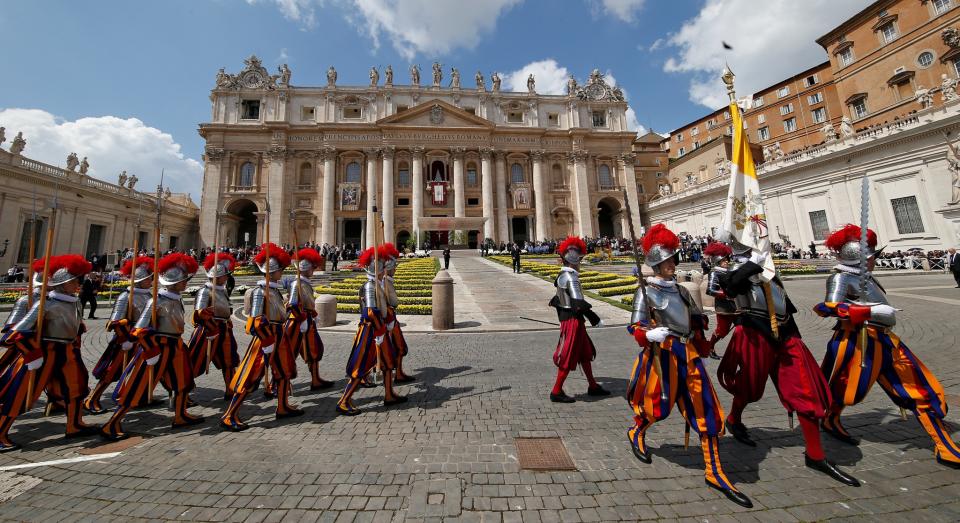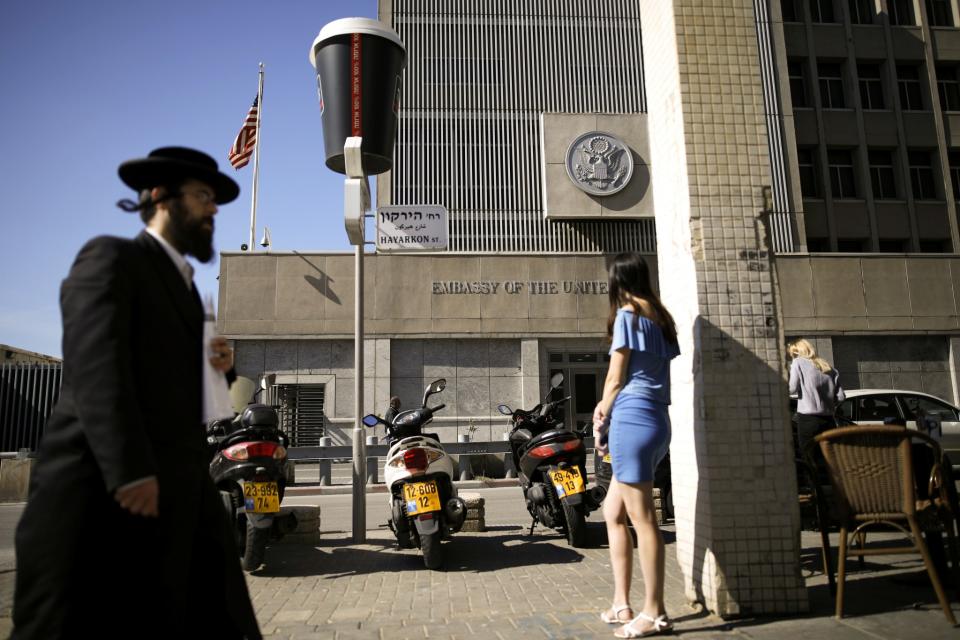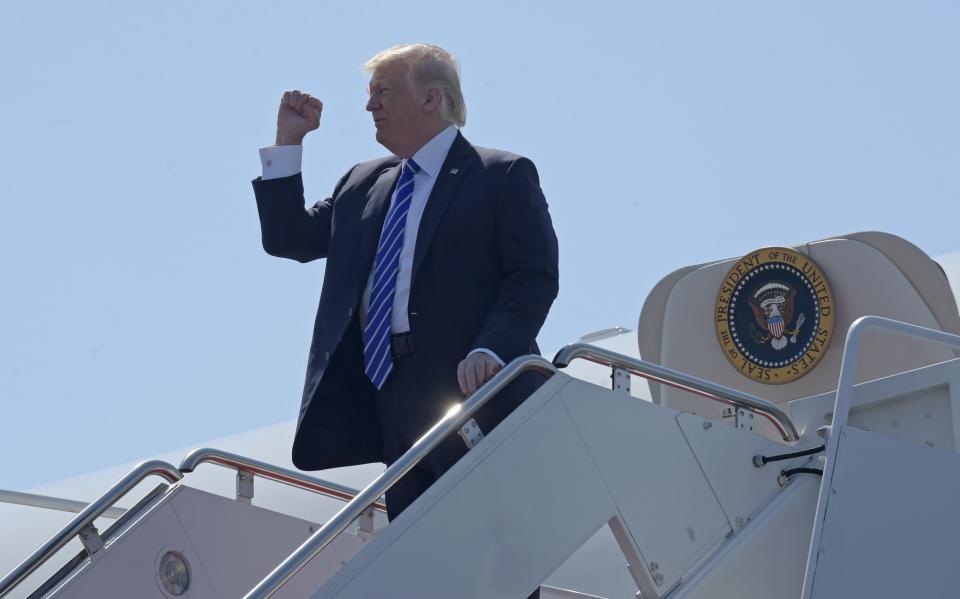Trump escaping chaos in Washington to turmoil abroad

WASHINGTON — George W. Bush’s first foreign destination as president was Mexico, a chance to showcase a relationship he built as Texas governor and had campaigned on as a credential for his ability to manage world affairs.
When Barack Obama ventured abroad for the first time after taking office, he went to Canada, a very traditional trip where adoring throngs reinforced his campaign promise to restore America’s tarnished reputation overseas.
Despite the personalized choreography — Bush all smiles at Mexican President Vicente Fox’s ranch, Obama basking in affection from Canadian crowds — both trips were fundamentally low-risk, conventional forays into foreign policy. Baby steps across the world stage, in effect.
But President Trump’s first foreign voyage will instead be an astonishingly ambitious adventure — Saudi Arabia, Israel, the Vatican, a NATO summit in Brussels, and a Group of Seven (i.e.: rich country) gathering in Sicily. He’s coming with a packed agenda of the weightiest issues in global affairs, like defeating ISIS, containing Iran, convincing the Muslim world to confront extremism, overhauling relations with crucial allies in Europe and Asia, and forging Middle East peace.

In Riyadh, Trump will attend a summit of leaders from across the Muslim world and give a speech to demand they do more to stop what he calls “radical Islamic terrorism.” He will also unveil an arms package for his hosts — notably missile defense systems and ships that might serve as a counterweight to Iran’s navy — that could run as high as $350 billion over 10 years, officials say.
“While the administration hasn’t outlined its Middle East strategy, I think I see one,” said Kori Schake, a Republican veteran of the National Security Council and the Pentagon. “It’s designed to repair the regional imbalance created by the Obama administration focusing narrowly on Iran’s nuclear program and the slow-burn strategy for countering ISIS. “
In Israel, he’ll meet with top officials, including Prime Minister Benjamin Netanyahu, before talks with Palestinian president Mahmud Abbas. He will also deliver a speech on prospects for Middle East peace.

At the Vatican, he’ll meet with Pope Francis, who at times has criticized him. In Brussels, Trump will come face to face with leaders of NATO, an organization he has decreed must change to be more effective at countering terrorism, and whose members he has squeezed to increase defense spending in line with their own prior commitments. In Sicily, he will meet with heads of state and government from the Group of Seven, who have been warily watching to see what “America First” means for them.
In short, the besieged, tumultuous White House — where aides increasingly look like it’s day 10 after the food ran out aboard their drifting lifeboat — has packed an entire first term’s worth of policy into a frenetic eight-day tour.
“I am heading on a very crucial journey,” Trump declared at the Coast Guard Academy commencement on Wednesday. “I’ll meet scores of leaders, and honor the holiest sites of these three great religions.”
Aides say privately that they are aware of the risks. They express concern that domestic developments like the Russia investigation might goad the president off script and onto Twitter. They also worry about the 70-year-old president’s physical health on a trip that would be taxing even for a younger man. They fret that any bad media coverage will lead Trump, who has regularly sought refuge over the past four months in the familiar comfort of his Trump-branded resorts, to avoid international travel in the future. One White House aide told Yahoo News that Trump has mused (possibly jokingly) about the possibility after 2017 of skipping annual summits that presidents typically attend in favor of sending Vice President Mike Pence. And the Trump team is mindful that overseas trips can become foreign traps.

Even before Trump boards Air Force One on Friday, the Israeli press has been hammering him for putting on hold his promise to immediately move the U.S. Embassy from Tel Aviv to Jerusalem. They have also knocked the White House’s refusal to unequivocally declare that the Western Wall is in Israel, and for reportedly setting aside just 15 minutes to visit Yad Vashem, the country’s official Holocaust memorial. And U.S. and Israeli officials apparently feuded over an Israeli request to have government officials, including Prime Minister Benjamin Netanyahu, accompany Trump on what will be the first visit by a sitting U.S. president to the Western Wall, one of the holiest sites in Judaism.
That was a trap of sorts, two U.S. officials told Yahoo News. Netanyahu sought the joint visit as a consolation prize for not seeing the U.S. Embassy moved to Jerusalem, they said, and the U.S. refused. While Israel declares Jerusalem as its undivided and eternal capital, the Palestinians hope to establish the capital of their hypothetical future state in East Jerusalem. The United States regards the status of the city as an issue to be negotiated between those two parties and has generally avoided gestures that undermine that position.

News reports alerted the Trump team to another problem: The presence at the Saudi summit of Sudanese leader Omar al-Bashir, who is wanted for war crimes. That touched off a flurry of diplomatic contacts. A senior Trump aide told Yahoo News on Thursday that “the president is going to that meeting expecting that he will not be there.” And, the official added for emphasis: “We don’t want him there, and we don’t think he will be there, and we appreciate our Saudi hosts not inviting him and telling him they don’t want him there.”
Beyond areas of tension, there are pure logistics. The Trump team called in veterans from Bush’s operation to handle the headache-inducing task of getting the president from meeting to meeting, country to country.
“Foreign trips are some of the most difficult things for a White House to execute,” explained Tommy Vietor, who was spokesman for the National Security Council during Obama’s administration.
“The logistics of moving a president around a foreign country are impossibly complicated. You never sleep because of jet lag and because Washington doesn’t care what time zone you’re in anyway. The issues are complex and the stakes couldn’t be higher. One day you’re meeting with the Israelis and Palestinians about Middle East peace. The next you’re trying to rally international support for Afghanistan,” Vietor said.
Afghanistan looms large over the NATO leg of the trip. The Trump administration is expected to announce after he returns that it will surge a few thousand troops there to beat back the Taliban.

While Trump aides play down prospects of a major breakthrough, officials and experts see potential long-term gains from a project led by Defense Secretary James Mattis: Prepare the coalition that has been assembled to defeat ISIS into one focused on containing Iran.
The countries meeting in Saudi Arabia “want a balanced effort to fight terrorism and destabilization by both Sunni [ISIS and al-Qaida] and Shi’ia [Iran], and they want progress on Palestinian-Israeli peace to make their increasing cooperation with Israel more public and palatable,” Schake said. “The Trump administration is giving it to them.”
____
Read more from Yahoo News:



